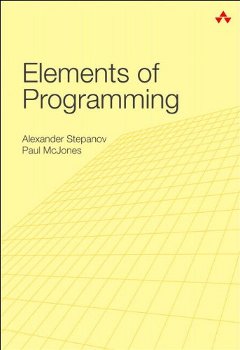Před pár dny mi konečně došla nová kniha od A. Stepanova (autor C++ STL) a P. McJonese, nazvaná Elements of Programming (EOP), která byla vydána v roce 2009. Tuto knihu, která bývá srovnávána s Knuthovým The Art of Computer Programming (TAOCP) (ať už svými myšlenkami, či matematickou náročností), bych vám chtěl v následujícím příspěvku velmi krátce představit.
Bohužel, zatím se omezím pouze na popis uvedený na obalu knihy a odkazy na další zdroje, protože z důvodu intenzivní přípravy na zkoušky jsem se k ní ještě nedostal, takže vlastní dojmy budou muset počkat až po (několikanásobném) přečtení :).

Elements of Programming provides a different understanding of programming than is presented elsewhere. Its major premise is that practical programming, like other areas of science and engineering,must be based on a solid mathematical foundation. The book shows that algorithms implemented in a real programming language, such as C++, can operate in the most general mathematical setting. For example, the fast exponentiation algorithm is defined to work with any associative operation. Using abstract algorithms leads to efficient, reliable, secure, and economical software.
This is not an easy book. Nor is it a compilation of tips and tricks for incremental improvements in your programming skills. The book’s value is more fundamental and, ultimately, more critical for insight into programming. To benefit fully, you will need to work through it from beginning to end, reading the code, proving the lemmas, and doing the exercises. When finished, you will see how the application of the deductive method to your programs assures that your system’s software components will work together and behave as they must.
The book presents a number of algorithms and requirements for types on which they are defined. The code for these descriptions—also available on the Web—is written in a small subset of C++ meant to be accessible to any experienced programmer. This subset is defined in a special language appendix coauthored by Sean Parent and Bjarne Stroustrup.
Whether you are a software developer, or any other professional for whom programming is an important activity, or a committed student, you will come to understand what the book’s experienced authors have been teaching and demonstrating for years—that mathematics is good for programming, and that theory is good for practice.
Další informace:

Dotaz
Ahoj, mohu se zeptat, na kolik Tě ta kniha přišla? Popřípadě mi prozradit, na kolik Tě vyšlo poštovné?
Rád bych si též pořídil pár zahraničních publikací, ale mám strach, aby cena poštovného několikrát nepřevýšila cenu objednaného zboží.
Dík předem za odpovědi :)
Tak už možná tuším:
Tak už možná tuším: amazon.com + shipito?
Re: Dotaz
Ahoj, tuhle knížku jsem si objednával odtud (pokud si to ale objednáš ze zahraničí, tak bych tipoval, že Tě to vyjde levněji).
Zde vyjde asi levněji (nemám
Zde vyjde asi levněji (nemám osobní zkušenost)
http://reading.cz/koupit/Elements-of-Programming-4054734/